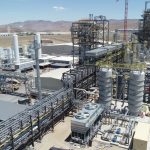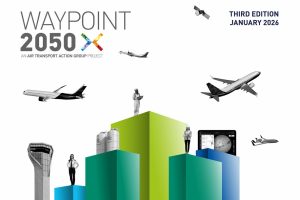ZeroAvia, one of the leading developers of hydrogen-electric propulsion systems for aircraft, has announced two major new aviation partnerships, one with turboprop manufacturer De Havilland Canada (DHC) and the other with the world’s third-largest airline, United, to help expedite the growing shift to zero-emission regional air transport. Rounding off a huge year of decarbonisation initiatives by a range of players across the aviation sector, DHC and ZeroAvia have signed a Memorandum of Understanding to offer the latter’s 2-megawatt ZA-2000 hydrogen-electric powertrain for new and in-service Dash 8-400 aircraft. Meanwhile, reports Tony Harrington, United has been confirmed as the latest investor in ZeroAvia, to speed the development of its 2-5mw ZA 2000-RJ powertrain for larger aircraft. Once a definitive agreement is reached with DHC, it will have options to purchase 50 ZeroAvia hydrogen-electric engines, while United expects to order up to 100 engines, with entry into service targeted for 2028.
De Havilland Canada and ZeroAvia plan to collaborate on a service bulletin for the Dash 8-400 certificate, which would enable the still-in-development ZA 2000 engine to be offered as a line-fit option for new aircraft, or through a retrofit programme, enabling existing aircraft to be converted to the new, zero-emission propulsion systems, offering operators a faster-to-market and less expensive alternative to introducing all-new zero-emission planes. As part of this programme, ZeroAvia will develop, with DHC’s support, a Dash 8-400 flight demonstrator to help achieve certification of the engine, and to demonstrate its operational and commercial potential. The companies plan to identify an existing route on which to operate the aircraft, targeting entry into service within five years, and will jointly promote hydrogen-electric aircraft engines with power-by-the-hour support.
More than 625 Dash 8-400 aircraft have been delivered to operators, logging more than 11 million flight hours and carrying in excess of 550 million passengers. In October, ZeroAvia and Alaska Air Group, the parent company of Alaska Airlines and its regional carrier Horizon Air, announced a partnership to develop a hydrogen-electric propulsion system for aircraft up to 76 seats, and offering a flight range of 500 nautical miles, or 926 kilometres. Tests will be conducted using a Dash 8-400 formerly operated by Horizon.
ZeroAvia’s stepped development programme will begin in coming weeks with the launch of a 19-seat Dornier 228 testbed aircraft equipped with hybrid propulsion systems – one conventional engine and one ZA 600 hydrogen-electric unit. Then, in 2022, the same aircraft will be tested again, this time with dual hydrogen-electric engines. ZeroAvia is targeting certification by 2024, when it expects to offer these powertrains for 10-20 seat aircraft with a flying range of 300 nautical miles (556 kilometres).
For the larger ZA 2000 engine, full-thrust ground demonstrations of a 1.8mw variant will be conducted by the end of next year, and, subject to successful trials, the company will target 2026 certification of that powertrain to support 40-80 seat regional aircraft, offering a flying range potentially exceeding 700 nm, or 1,296 km. By 2027, ZeroAvia plans to further extend the programme to aircraft of up to 90 seats. Then, in the space of just over a decade, the company is targeting derivative powertrains to deliver substantial capacity and range increases, beginning in 2030 with 100-200 seat aircraft flying up to 2,000 nm (3,700 km), extending in 2035 to 200 seats and 3,000 nm (5,560 km), and 200 seats over 5,000 nm (9,260 km) by 2040.
“De Havilland Canada has made significant strides on emission reductions and shown a big commitment to greener aviation, and the next step is to go to true zero-emission using hydrogen-electric engines,” said ZeroAvia CEO Val Miftakhov. “Partnering with De Havilland Canada puts ZeroAvia on a defined pathway to line-fitting into new airframes and signals OEM [original equipment manufacturer] appetite to make the switch to certified, zero-emission propulsion as soon as possible.”
The Chief Transformation Officer of De Havilland Canada, Dave Riggs, welcomed the ZeroAvia collaboration to develop “climate-friendly propulsion” for regional operations. “De Havilland Canada has a strong belief in hydrogen-electric technology as a viable solution for decarbonising aviation,” he said.
In a separate development, United Airlines, one of the most active proponents of technology-driven decarbonisation, has been confirmed as a participant in ZeroAvia’s recent $35 million capital raising, which boosted total investment in the company to $115 million. Other investors in the latest fundraising round were Alaska Air Group, Amazon’s Climate Pledge Fund, AP Ventures, Breakthrough Energy Ventures, Horizons Ventures, Summa Equity and Shell Ventures. Their collective participation will be used to accelerate development of ZeroAvia’s 2-5 mw powertrain for larger turboprop aircraft and small jets.
United’s CEO, Scott Kirby, a vocal advocate of direct decarbonisation measures over carbon offsetting, this year has announced a range of major initiatives, including industry-leading investments in sustainable aviation fuel, orders for latest-generation Airbus and Boeing jets, investment in Swedish electric aircraft maker Heart Aerospace, conditional commitments to 200 19-seat Heart ES-19s, and up to 50 Overture supersonic jets from Boom Supersonic, which both companies claim will use 100% SAF. As well, just weeks ago, United operated the first commercial flight to use 100% SAF in one engine, a Boeing 737 MAX service from Chicago to Washington DC.
Announcing the company’s ZeroAvia partnership, in which United has joined British Airways and Alaska Airlines as investors in the hydrogen propulsion company, Kirby said: “Hydrogen-electric engines are one of the most promising paths to zero-emission air travel for smaller aircraft, and this investment will keep United out in front on this important emerging technology. United continues to look for opportunities to not only advance our own sustainability initiatives, but also identify and help technologies and solutions that the entire industry can adopt.”
As part of the deal, in which it becomes the largest airline investor in ZeroAvia, United announced the conditional purchase of 50 ZA 2000-RJ engines, and options for another 50, potentially to retrofit up to 50 United Express CRJ-550 twinjets from 2028, and further progressing ambitions “to be 100% green by 2050 without relying on traditional carbon offsets.”
Kevin Eggers, a founding partner of AP Ventures, an independent venture capital fund which has also invested in ZeroAvia, said the propulsion company offered “a credible and compelling pathway to zero-emission aviation, enabling the long-term future of the industry.” London-based AP Ventures is specifically focused on investments in hydrogen and its role in decarbonising the energy sector. “ZeroAvia is pioneering practical clean aviation solutions in a meaningfully short time frame,” said Eggers. “We are excited to work alongside established industry companies such as United Airlines, Alaska Airlines and British Airways to further this historic transformation.”
ZeroAvia’s Miftakhov welcomed the new investors in his company, which recently has also inked other deals with sustainable investments group Rose Cay, Hindustan Aeronautics Limited, ASL Aviation Holdings, the regional jet division of Mitsubishi Heavy Industries and Rotterdam The Hague Airport. “As we prepare for ground and flight testing of our first commercial intent product in the coming weeks, this backing by our investors will enable us to accelerate delivery of our engine for larger aircraft,” he said.
Image: United Airlines has conditionally agreed to purchase ZeroAvia engines to retrofit United Express CRJ-550 twinjets
MORE HYDROGEN NEWS →














More News & Features
New initiative formed to accelerate SAF adoption and production in the Pacific Northwest
Airfreight giants DHL Express and FedEx announce big US SAF deals
New Zealand initiatives announced on electric aircraft, hydrogen refuelling and carbon removals
EU states to mobilise 500 million euro support for early-mover eSAF production startups
LanzaJet produces first next generation, ethanol-based SAF at flagship Freedom Pines refinery
European Commission announces Sustainable Transport Investment Plan to advance low-and-no-carbon fuels